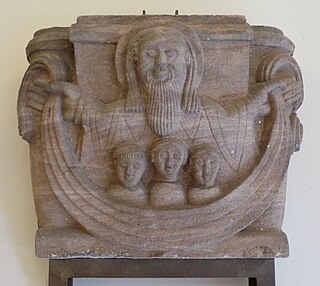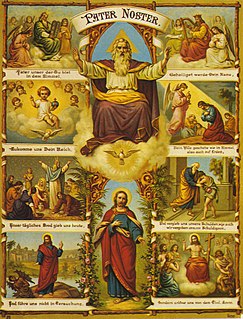Related Research Articles

Arianism is a Christological doctrine first attributed to Arius, a Christian presbyter in Alexandria, Egypt. Arian theology holds that Jesus Christ is the Son of God. who was begotten by God the Father. The Arian concept of Christ is based on the belief that the Son of God did not always exist but was begotten within time by God the Father, therefore Jesus was not co-eternal with God the Father. Arianism holds that the Son is distinct from the Father. The term Arian is derived from the name Arius; it was not what the followers of Arius's teachings called themselves, but rather a term used by outsiders. The nature of Arius's teachings and his supporters were opposed to the theological doctrines held by Homoousian Christians, regarding the nature of the Trinity and the nature of Christ.

The extant manuscripts of the book Antiquities of the Jews, written by the first-century Jewish historian Flavius Josephus around 93–94 AD, contain two references to Jesus of Nazareth and one reference to John the Baptist.

Justin Martyr was an early Christian apologist and philosopher.

Titus Flavius Josephus, born Yosef ben Matityahu, was a first-century Romano-Jewish historian who was born in Jerusalem—then part of Roman Judea—to a father of priestly descent and a mother who claimed royal ancestry.
In Christianity, Sabellianism is the Western Church heresy equivalent to Patripassianism in the Eastern Church, which are both forms of theological modalism. Sabellianism is the belief that the Father, Son and Holy Spirit are three different modes or aspects of God, as opposed to a Trinitarian view of three distinct persons or hypostases within the Godhead.

Hippolytus of Rome was one of the most important second-third century Christian theologians, whose provenance, identity and corpus remain elusive to scholars and historians. Suggested communities include Palestine, Egypt, Anatolia, Rome and regions of the mideast. The best historians of literature in the ancient church, including Eusebius of Caesarea and Jerome, openly confess they cannot name where Hippolytus the biblical commentator and theologian served in leadership. They had read his works but did not possess evidence of his community. Photios I of Constantinople describes him in his Bibliotheca as a disciple of Irenaeus, who was said to be a disciple of Polycarp, and from the context of this passage it is supposed that he suggested that Hippolytus so styled himself. This assertion is doubtful. One older theory asserts he came into conflict with the popes of his time and seems to have headed a schismatic group as a rival to the bishop of Rome, thus becoming an antipope. In this view, he opposed the Roman Popes who softened the penitential system to accommodate the large number of new pagan converts. However, he was reconciled to the Church before he died as a martyr.

Nontrinitarianism is a form of Christianity that rejects the mainstream Christian doctrine of the Trinity—the belief that God is three distinct hypostases or persons who are coeternal, coequal, and indivisibly united in one being, or essence. Certain religious groups that emerged during the Protestant Reformation have historically been known as antitrinitarian.

James the Just, or a variation of James, brother of the Lord, was a brother of Jesus, according to the New Testament. He was an early leader of the Jerusalem Church of the Apostolic Age. He died as a martyr in AD 62 or 69.
The Basilidians or Basilideans were a Gnostic sect founded by Basilides of Alexandria in the 2nd century. Basilides claimed to have been taught his doctrines by Glaucus, a disciple of St. Peter, though others stated he was a disciple of the Simonian Menander.

"Bosom of Abraham" refers to the place of comfort in the Biblical Sheol where the righteous dead await Judgment Day.

The parable of the rich man and Lazarus is a parable of Jesus appearing in the Gospel of Luke.
The Apostolic Constitutions or Constitutions of the Holy Apostles is a Christian collection divided into eight books which is classified among the Church Orders, a genre of early Christian literature, that offered authoritative "apostolic" prescriptions on moral conduct, liturgy and Church organization. The work can be dated from 375 to 380 AD. The provenance is usually regarded as Syria, probably Antioch. The author is unknown, although since James Ussher it has often considered to be the author of the letters of Pseudo-Ignatius, perhaps the 4th-century Eunomian bishop Julian of Cilicia.

In Christian theology, the incarnation is the belief that Jesus Christ, the second person of the Trinity, also known as God the Son or the Logos, "was made flesh" by being conceived in the womb of a woman, the Virgin Mary, also known as the Theotokos. The doctrine of the incarnation, then, entails that Jesus is fully God and fully human.

In Christology, the Logos is a name or title of Jesus Christ, derived from the prologue to the Gospel of John "In the beginning was the Word, and the Word was with God, and the Word was God", as well as in the Book of Revelation, "And he was clothed with a vesture dipped in blood: and his name is called The Word of God." These passages have been important for establishing the doctrine of the divinity of Jesus since the earliest days of Christianity.
Subordinationism is a belief that began within early Christianity that asserts that the Son and the Holy Spirit are subordinate to God the Father in nature and being. Various forms of subordinationism were believed or condemned until the mid-4th century, when the debate was decided against subordinationism as an element of the Arian controversy. In 381, after many decades of formulating the doctrine of the Trinity, the First Council of Constantinople condemned Arianism.

Hades, according to various Christian denominations, is "the place or state of departed spirits", also known as Hell, borrowing the name of the Greek god of the underworld.
Caius, Presbyter of Rome was a Christian author who lived and wrote towards the beginning of the 3rd century. Only fragments of his works are known, which are given in the collection entitled The Ante-Nicene Fathers. However, the Muratorian fragment, an early attempt to establish the canon of the New Testament, is often attributed to Caius and is included in that collection.

In Christian eschatology, the Antichrist, or anti-Christ, refers to people prophesied by the Bible to oppose Christ and substitute themselves in Christ's place before the Second Coming. The term Antichrist is found five times in the New Testament, solely in the First and Second Epistle of John. The Antichrist is announced as the one "who denies the Father and the Son."
The concept of the Antichrist has been a vigorous one throughout Christian history, and there are many references to it and to associated concepts both in the Bible and in subsequent ecclesiastical writings.
Hermeneutics is the theory and methodology of interpretation. The tradition of Western hermeneutics starts in the writings of Aristotle and continues to the modern era.
References
- ↑ Wikisource:Discourse to the Greeks concerning Hades
- 1 2 Whiston, William (1987). The Works of Josephus. Peabody, MA: Hendrickson Publishers. p. 873. ISBN 0-913573-86-8.
- 1 2 Whiston, William (1987). The Works of Josephus. Peabody, MA: Hendrickson Publishers. p. 872. ISBN 0-913573-86-8.
- ↑ Huidekoper, Frederic (1854). The Belief of the First Three Centuries... New York: Crosby, Nichols, and Co. p. 169f. Retrieved 2007-05-26.
josephus's discourse to the greeks concerning hades.
; Niese, Benedictus. "Encyclopaedia of Religion and Ethics entry on Josephus" (PDF). Retrieved 2007-07-11. (From the website of the Project on Ancient Cultural Engagement.) - ↑ Niese, Benedictus. "Encyclopaedia of Religion and Ethics entry on Josephus" (PDF). Retrieved 2007-07-11. (From the website of the Project on Ancient Cultural Engagement.)
- ↑ Goldberg, Gary. "Did Josephus write the "Discourse on Hades?" (from "Josephus Mail and FAQs")" . Retrieved 2007-07-11.
- ↑ Roberts, Alexander. "Note 1579 to Hippolytus, "Against Plato, on the Cause of the Universe" from the Ante-Nicene Fathers, Vol. 5. (Ed. with James Donaldson.)" . Retrieved 2007-07-11.
- ↑ Roberts, Alexander. "Chapter XLVII of "Dialogue with Trypho" from the Ante-Nicene Fathers, Vol. 1. (Ed. with James Donaldson.)" . Retrieved 2007-07-15. (Here the quote is given as: "Wherefore also our Lord Jesus Christ said, 'In whatsoever things I shall take you, in these I shall judge you.'")